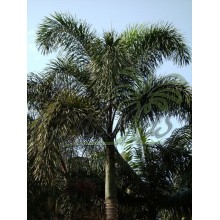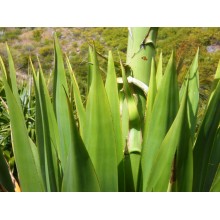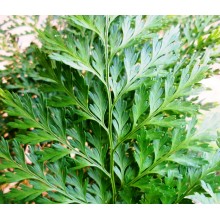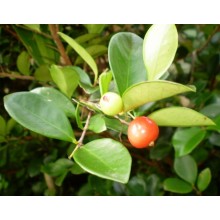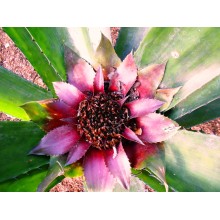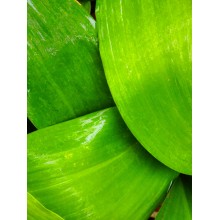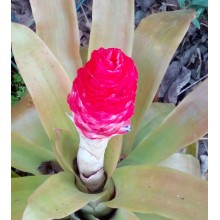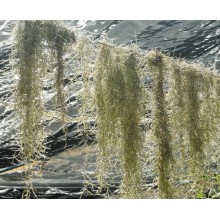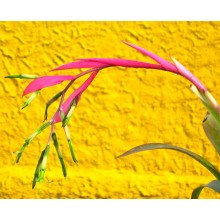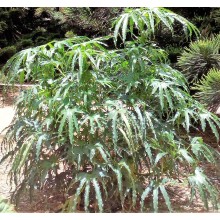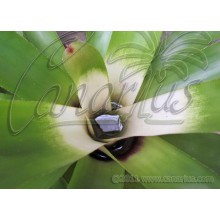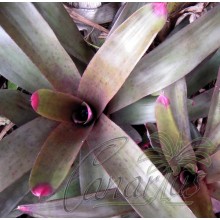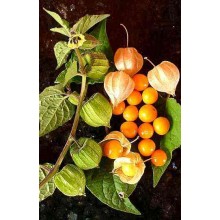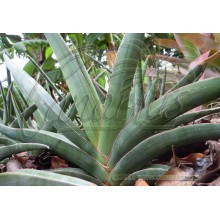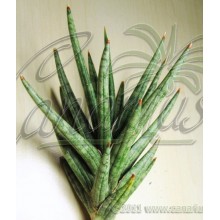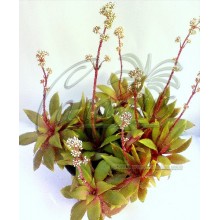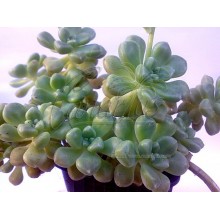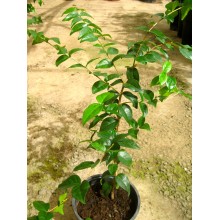Top sellers
Latest top sellers products on Canarius.com

-
Wodyetia bifurcata
Wodyetia bifurcata
Foxtail palm is a beauty with ruffled leaves. Native to exposed gravel hill tops on Cape Melville, in NE Australia. This palm has a solitary, smooth, grey-brown trunk, a remarkable crownshaft and plumose, ruffled dark-green leaves. It was discovered in 1983 and it soon became very popular!
43,50 € -
Agave caribaeicola
Agave caribaeicola
Hard to find agave native to a group of islands in the lesser Caribbean islands. It is definitely a winner, with a nicely shaped rosette of bright green S-shaped leaves with red toothed margins. It is a tropical species and should be kept above 8 C and protected from frost or hail.
26,40 € -
Davallia canariensis
Davallia canariensis
Epiphytic fern from the Canary Islands, which is able to grow on tree trunks, rockeries or in hanging pots.
28,50 € -
Eugenia reinwardtiana
Eugenia reinwardtiana
Eugenia reinwardtiana is a shrub to small tree native to rainforests in northern Queensland, Australia, Indonesia, and the Pacific Islands. Common names include Cedar Bay Cherry, Mountain Stopper, and Nioi.
41,50 € -
Canistrum giganteum 'Leopardinum'
Canistrum giganteum 'Leopardinum'
Imrpressive tough bromeliad in the genus Wittrockia. This form has a special attractive dark mottling on the leaves. The inflorescence comes out as a very large flower-like structure or red-maroon colours. Not a hybrid, this is probably a local form of Wittrockia gigantea, formerly known as Canistrum giganteum. It is easy to grow, but quite slow.
28,00 € 33,00 € -
Aspidistra elatior 'Bubba'
Aspidistra elatior 'Bubba'
This selection of Aspidistra elatior from Florida is a particularly nice, wide-leaf, solid dark green selection. It grows to at least 1 m tall with broad foliage that may exceed 15 cm in width. A bold garden specimen.
19,40 € -
Quesnelia quesneliana
Quesnelia quesneliana
Beautiful bromeliad with pinkish-bronze coloured leaves. It blooms with an incredible long-lasting pink "artichoke".
23,68 € 29,60 €Reduced price! -
Heliconia bourgaeana
Heliconia bourgaeana
This hard to find species is an excellent garden subject, suitable to non-tropical climates. It blooms in April to August in the Canary Islands. Bracts are solid, glossy purplish red, with bright yellow flowers inside.
48,00 € -
Tillandsia usneoides - Spanish Moss, Airplant
Tillandsia usneoides - Spanish Moss, Airplant
A moss-like plant not related to mosses at all. Spanish Moss grows on trees in America, with no roots at all. It is Gray when dry and light green when wet, it hangs from tree branches and grows easily. This "Air Plant" can take short freezes to about -6 C.
19,00 € -
Billbergia nutans var. schimperiana
Billbergia nutans var. schimperiana
Wide-leaved variety of the popular cold-resitant Billbergia nutans. It is just as easy as the type species but the plant has a lushier, more exotic look.
21,00 € -
Abelmoschus manihot 'Choux Kanak' - Aibika
Abelmoschus manihot 'Choux Kanak' - Aibika
This shrub is both an ornamental plant and a nutritious vegetable, often called Aibika. It was domesticated in South Asia and spread to Papua and the Pacific islands. This smooth cultivar, with wide palmate leaves, is a superior strain from Melanesia.
21,92 € 27,40 €Reduced price! -
Neoregelia nivea
Neoregelia nivea
White! Unique species because the center becomes all white when flowering. Very nice green foliage, almost spineless. It was described in 1996, from the Brazilian state of Sao Paulo.
12,00 € -
Neoregelia spectabilis Hojas Anchas
Neoregelia spectabilis Hojas Anchas
This is one of the most beautiful bromeliads for the garden, with exciting colours. This clone has particularly wide leaves with changing colours of green-gray-brown. The leaf tip is bright pink. It can take full sun.
21,80 € -
Physalis peruviana
Physalis peruviana
Herbaceous shrub with japanese-lantern shaped fruit with a tasty edible orange berry inside. The orange-red papery covering over the fruit resembles paper lanterns.
20,30 € -
Sansevieria ehrenbergii - Large Plant
Sansevieria ehrenbergii - Large Plant
Giant Plant: Perfect 60-90 cm wide fan - Form with green long leaves, probably originating from Ethiopia or Eritrea of this spectacular fan-succulent with thick blue-green leaves. Seldom offered for sale. Slow growing.,
27,00 € 54,00 €Reduced price! -
Sansevieria francisii
Sansevieria francisii
NEW ! - plantlets with own roots in 6cm.pot -Distinctive species with short, conical leaves arranged in tightwhorls of five. The new plants grow on the tip of rigid, ascendingstolons produced at the base of the stem. Slow but easy,
11,20 € -
Crassula orbicularis var. rosularis
Crassula orbicularis var. rosularis
Clumping Crassula with green flat leaves, purple on the lower face, with ciliate margins and acute tip. Terminal ascending inflorescences to 15-20 cm. The whole plant becomes more purple when stressed in hot sun or in cool temperatures.
10,50 € -
Graptopetalum mendozae
Graptopetalum mendozae
NEW ! - Three unrooted heads of 3-4 cm. Small succulent with thick, pearl-coloured leaves and white flowers. It is suitable for hanging pots. Native to Mexico, Veracruz, in the area of Tepetzintla, at 100-150 m.
10,50 € -
Eugenia uniflora Black - Black Pitanga
Eugenia uniflora Black - Black Pitanga
Black variety of the suriname cherry. This cultivar is usually larger and sweeter than most other types.
37,20 €















